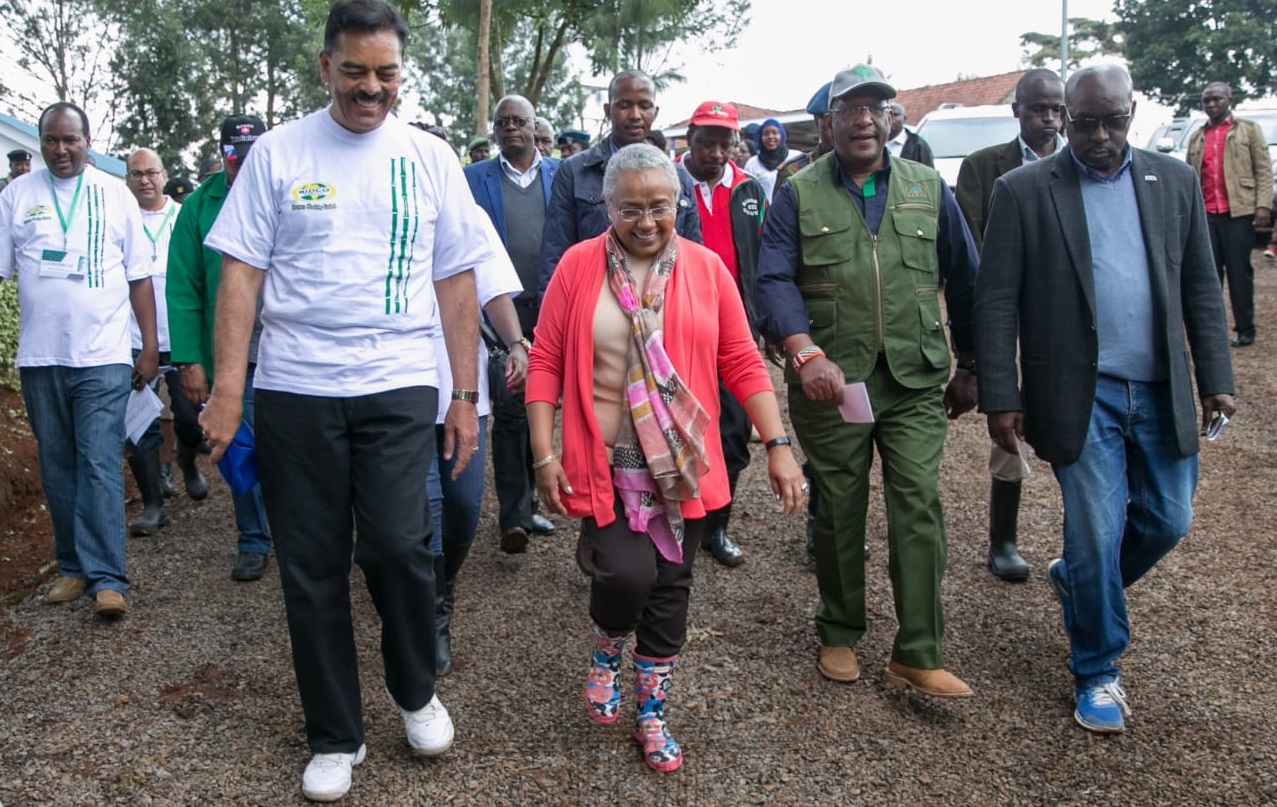Bidco Africa’s quest to plant trees to increase the forest cover as part of its sustainability activities has received a major boost from the First Lady Margaret Kenyatta who last week participated in the initiative that seeks to save the country’s key water towers.
The First Lady joined other partners to grow more than 10,000 bamboo seedlings at Ruiru Dam in Kiambu County. This was the third campaign under the initiative for Bidco which has taken the bold step of helping increase the forest cover by planting bamboo trees. The first two planting exercises were carried out at Ndakaini Dam in Murang’a County.
Launched in 2017 by the then Cabinet Secretary for Environment and Forests Prof. Judy Wakhungu, the project dubbed ‘Save Our Water Towers’ aims to grow up to one million bamboo across Kenya’s most important water towers including the Mau Forest Complex, The Aberdares, The Charangani Hills and the Mt Elgon.
[ SEE ALSO: Bamboo is the newest road to riches in Kenya ]
Ruiru Dam was a good choice as it supplies up to 30% of the water consumed in Nairobi and its environs after Ndakaini Dam.
Speaking at the event, Mrs Kenyatta described the initiative as a noble move that will go a long way in addressing the challenges of drought and the irregular rainfall. Noting that there are no fancy solutions for climate change, Ms Kenyatta added that it is through increasing the forest cover and exploiting nature in a responsible that will maintain the right ecological balance.
“I am particularly happy to see Bidco Africa take the lead in matters of environment and natural resources,” she said. “To see one of the biggest industries in East Africa leading the initiative geared towards clean energy and a healthy environment is cause for great optimism and encouragement that perhaps it is possible to meet the sustainability challenges of our time and country if we all play part.”
Bidco Africa chose bamboo as the perfect conservation agent since it is a clean source of renewable energy that is also good for the environment. Bamboo is also ideal for soil erosion control, rehabilitating degraded soils and cleaning the air through carbon cycle.
The move comes at a time when several estates in Nairobi and its environs still suffer water shortages despite return of the rains.
The manufacturer brought together several partners to advance the project including Safaricom, SBM Bank, The Kenya Forest Service (KFS), The Kenya Forestry Research Institute (KEFRI), Kenya Defense Forces (KDF), Fresha, Kenya Prisons, Mount Kenya University, WASPA and Greens of Africa Foundation.
Bidco Africa Chairman Vimal Shah reiterated the company’s stand on sustainability, noting that business should be a force for good.
[ READ: The seven things you need to know about bamboo farming ]
“We are committed to reducing poverty, promoting sustainable and inclusive growth, ending hunger and improving food security, combating climate change, ensuring healthy living for all and all and ensuring responsible production and consumption,” Mr Shah said. “We are committed to these because they make us a better business and more importantly contribute to a future that we can be proud to pass onto the next generation.”
The move comes at a time when several estates in Nairobi and its environs still suffer water shortages despite return of the rains. The partnership with the Nairobi City Water and Sewerage Company makes a lot more sense as the initiative seeks to address one of the city’s most important and vital need: clean and sufficient water.
[ NEXT: How Chris Kirubi is keeping warm during this cold season ]













Leave a comment